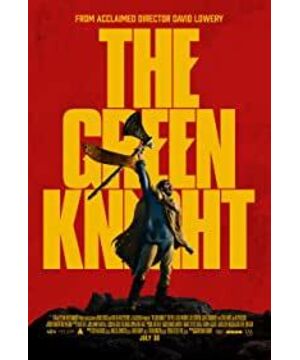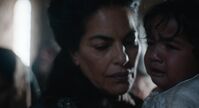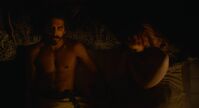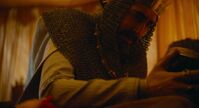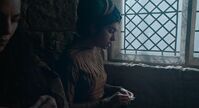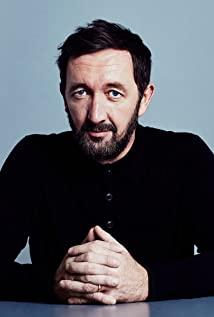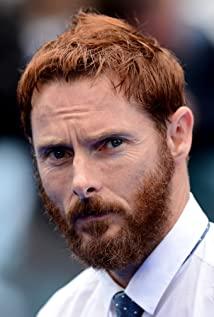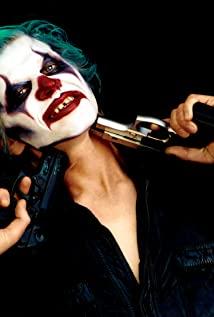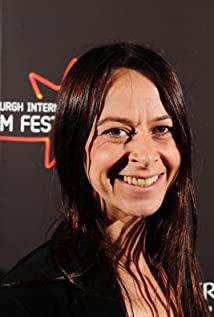Produced by Hollywood upstart A24, director David Lowe's latest work "The Green Knight" is finally online.
But don't misunderstand the title. If you're in the mood for a Sleepy Hollow-style fantasy, or an epic like King Arthur, take a detour too.
Because "The Green Knight" is not a strong plot, fast-paced drama, but a psychological thriller dressed in fantasy, a rich allegorical poem (the film is adapted from the medieval English poem "Sir Gawain and Green Knight").
However, if you are a fan of A24's previous series of horror movies, such as The Witch, The Lighthouse, A Midsummer Nightmare, etc., then this movie should still suit your appetite.
First of all, I hope you will not be frightened by the "incomprehensible" voices on the Internet or the long-winded "popular science" of knights. Although the "green knight" has repeatedly appeared in the five-pointed star representing chivalry - a symbol of piety, generosity, goodwill, loyalty and friendship. These five qualities appear one by one as a test of the protagonist Gawain, and they are expressed to varying degrees in different passages.
But in the process of watching, even if you can't understand the one-to-one correspondence between the storyline and the virtues of knighthood, it will not prevent you from immersing yourself in the story with an excellent audio-visual experience.
In fact, only the first 15 minutes of the film are not very friendly to the audience: if you don't know anything about this legend, you can't immediately understand the true identity of Gawain's mother and girlfriend. But that doesn't detract from the brilliance of an adventure about growing up: we follow a restless Gawain as we reluctantly step into a self-honing monastery, stunned by the amount of bizarrely stylized photography along the way.
Just like the long shot taken above: after the 360-degree circle clockwise, Gawain, who was kidnapped by the gangsters, was turned into a dead bone; and then in a counterclockwise circle in the opposite direction, Gawain struggled to get up from the ground.
When you notice the difference between clockwise and counterclockwise, you know that it is not describing some fantasy event or parallel universe. This knight is a "dream" of Gawain, which points out two possibilities in the passage of time: sitting still or fighting to survive.
In my past movie viewing experience, I can't seem to think of similar ideas in other movies. Perhaps only the "Red Face and Dry Bones" scene in David Lowe's previous film, "The Ghost", is similar. This exquisite design of life and death, resurrection from the dead is found in literary works, such as Lu Xun's short story "Resurrection".
There is also the scene of encountering the "attacking giant" in the valley: the exhausted Gawain tried to ride on the shoulders of the giant to hitch a ride, but when the giant spread out his huge palm, Gawain was so frightened that he retreated again and again—— What the director wants to say is: the practice of self-discovery can only rely on oneself, and there is absolutely no shortcut. When everyone thinks about Tang Seng's study of scriptures, they will understand.
Of course, if it were all such a frame-by-frame interpretation, it would be endless. Because we can further ask: Who are the giants? Where did these behemoths come from? And who is the holy fox who has followed Gawain since he hit the road? Was Gawain's mother an illusion? What about the blind old lady in the castle? Is it also the "split" of Gao Wen's mother?
In addition to the unidentified characters, there are also many doubts in the plot: as a reward for "you chose the right one this time", it is understandable that the green axe was lost and recovered, but why is the magic belt stolen by the bandits in the hands of the castle lady? Also: Alicia Vikander is playing Lady Castle and Gawain's girlfriend, so what's the point? Do you want to explain that Gao Wen is actually "single-minded", but because of the purpose of utilitarianism and the gap between classes, he cannot take that step?
In fact, it is normal to have a question mark on the face, and "not photographing clearly" is intentional. David Lowe's purpose is to ask people to constantly ask themselves in the process of watching. And since this is "poetry", of course it won't make it too clear.
Poems appeal to private emotions and even private life experiences, all ambiguous foreshadowings and symbols, in order to break the narrative strategy based on strict causality, so as to give the audience more and greater space for interpretation. Who said that a person's hidden psychological phenomenon and mental process will follow a strict "law of cause and effect"? The audience can only empathize through Gawain's thoughtful twinkling eyes: what you read from it is what it is. This is not only Gawain's journey of self-discovery, but also discovering yourself.
Therefore, we can exclude the metaphors and symbols in the details, which do not have the actual narrative function. In order to grasp the core of the expression of "The Green Knight", we only need to answer the following two questions: 1. What is a "Christmas game"? 2. Who is the "Green Knight"?
1. What is the "Christmas Game"?
The ins and outs of the game are as follows: When King Arthur and the Knights of the Round Table held a Christmas banquet, a green knight who looked like Groot came uninvited and proposed to the gentlemen present to play a game that sounded absurd— - Who do you bring seeds? If it's a knight, come and kill me!
We are not unfamiliar with such tricks at first glance: Niu Er in "Water Margin" forced Yang Zhi to play it. But although the game is simple, the rules are tricky. The Green Knight directly copied the logic of homomorphic revenge of "an eye for an eye, a tooth for a tooth" in the "Code of Hammurabi": how you hurt me now, on the same day a year later, I will return it all.
Just as the wily knights of the round table were thinking that "there will be demons when things go wrong", Sir Gawain, the second generation of power, couldn't sit still. Originally, I had always been confused and could not find a sense of existence, and the atmosphere was all highlighted by this, so I simply forced myself to prove my worth by challenging the Green Knight.
But the problem is: the Green Knight is not here to "challenge" at all, but to "undertake". He straightened his neck and waited to be chopped off, so that Gao Wen, who couldn't get off the stage in full view, had to give in. And sure enough, the green knight was an immortal body, and after a knife fell, he picked up his head and walked away triumphantly. At the end of the day, he also left this sentence: Don't forget to fulfill the contract after one year!
This is basically the story of weird games and games. In short, this is a trick of "invite you to enter the urn", and it is a must-lose game of "one end for another, and a thousand miles to send people's heads".
The game is not difficult, but what is difficult to understand is: what is the purpose of this game? Is it because the Green Knight has been alone in the church for a long time, empty and lonely, and he has to sign a "yin-yang contract" with the world every now and then to relieve his boredom? - NO.
The essence of this "Christmas game" is: to live to the death. First of all, we must pay attention to the prefix of this game: Christmas.
Everyone must know that Jesus took the initiative to die for the sins of all mankind, and was resurrected and ascended to heaven three days later. Whether in the original poem of Sir Gawain and the Green Knight, or in this adaptation, we can see a lot of religious elements.
For example: all the witch-like characters in the film (except Gawain's girlfriend Essel) and Gawain in the wilderness took the initiative to take up his "sin" - the green axe that cut off the head of the green knight, instantly reminds people of "Christ". The Last Temptation" and "The Passion" of Jesus' crucifixion.
Of course, it's too complicated to think about "living to the dead" in terms of religion or atonement, so let's go back to the original meaning of the word: people say it all the time, but what does it really mean?
Living towards death is actually a concept put forward by the German philosopher Heidegger in Being and Time. Heidegger believes that people usually use the word "death" together to be inappropriate. Death is a process, and death is the end of death.
This sentence is a bit confusing, and the explanation is: life is a countdown that is doomed to wither once it starts, so when a person is born, it is already a "mortal thing" - whether you live a hundred years old or die in the middle, or simply A person like Gawain has only one year left to live, and this period of time, long or short, is always rushing to death.
If it had to say that there was any "purpose" in it, it would be death. In this sense, the whole life of a person is a process of "living towards death", and "death" means that this process is finally over.
It's really frustrating to say that. It is no wonder that most of the Chinese are relatively silent about death. Just like the situation described in "Legend": when you say "this child is mortal", you will inevitably be beaten (there is also a long similar line in "Ghostbusters") .
What the world believes in is the completely opposite value to Heidegger, which is just like what Confucius said, "If you don't know life, how can you know death", or the common people's vernacular, "It is better to die than live." Therefore, the reason why "The Green Knight" may make some people feel uncomfortable is that it has to reverse the "natural" truth-unknown death, how to know life? It's better to die than live.
So, what is the significance of living such an "axis"? David Lowe thinks: Very meaningful. "Life" has meaning only if you live to death. Otherwise, if you don't die like the Green Knight, "life" will not exist. Because infinite + endless, there is no need for meaning at all. Not only is "not dead" meaningless, but even "I don't know how to die" is meaningless.
Let's think about it: When Gawain was shocked that he had only the last year of his life left, before he fell into a constant panic: Is his life really meaningful? Did he really value his life?
The two scenes at the beginning of the film have already briefly explained to us who Gao Wen is. The first freehand shot of the title is to show that heroes are not always heroes, and the hero's mortal body needs to be reborn from ashes.
The second long shot is even more interesting: the camera retreats from the miserable world of freezing weather and ragged roads all the way to Gawain, naked and sleeping in the gentle village. It turns out that this is a master who is indifferent to the sufferings of the world. Essel asked him: Can you be considered a knight? Gawain replied: I still have time—meaning he still has a lot of time to squander before becoming a real knight.
Fifteen minutes before the appearance of the Green Knight, we can see what the initial personality of this anti-hero looks like: he hangs around with prostitutes all day, but he holds the attitude of a scumbag who does not refuse or take initiative, and treats religion. The belief is also not pious, and although he is close to the royal family, he does not have any military exploits. One sentence summary: an ignorant dude.
Not to mention that King Arthur didn't know what this nephew was doing all day long, even Gawain himself despised himself from the bottom of his heart - but he really couldn't find the purpose of life and the meaning of existence. Just when his life fell into a state of anxiety day after day, a pool of stagnant water, his mother couldn't sit still, and finally sacrificed the big killer of the green knight to force her son to grow up as soon as possible.
This is often the case: people are not very good at living, and can only "dead and live". The power of cowardice, greed, lust, and vanity is so great that the so-called thought cannot be awakened without driving people into a desperate situation at the level of survival. It is very important to recognize the sin of wasting time, and to know that life is as fragile and short as passing by.
Only when the process of "living to death" is exhausted to the maximum extent, can people truly inspire and truly feel the "self". David Lowe's opinion is clear: the so-called "self" is the product of despair. It is forced out, not the existence of innate essence, but the invention of human beings, free and self-made. Although the process of self-discovery is accompanied by the fear of the abyss, in the end, "you can die in the evening."
2. Who is the "Green Knight"?
After talking about what the "Christmas game" is and why this game is played like this, we have to talk about who the "green knight" is, the creator of the rules of the game.
In the original work, the "green knight" is the castle lord played by Joel Edgerton. David Lowe made a drastic adaptation on the basis of the original poem: The Green Knight is no longer related to the castle owner, but became the god that Gawain's mother invited to save her son, and the magic belt was also made by Gawain's mother for her son. .
The changes in the origin of these identities are not important. What is important is: what exactly does the "Green Knight" represent? ——Representing nature in contrast to man. Or call it another name: eternity.
First of all, please pay attention to the image of the Green Knight: in the original work, it is not a "tree man" face, David Lowe's packaging of his image is very obvious: the reason why the Green Knight is immortal is because of it It symbolizes the creator of thousands of worlds - nature that can make all life cycle back and forth (you may wish to recall the scene of resurrection from the dead earlier). There is also such a picture detail: when the green knight put down the axe, the smooth stone surface that the axe touched immediately grew moss.
And David Lowe was afraid that the audience would still not understand the symbolism of the Green Knight, so he added a long dialogue between Mrs. Castle and Gawain to clarify:
Green is the color of this land, the color of life and creatures... Green is the color left behind after the enthusiasm has dissipated, the color of the passion no longer, the people who have passed away. After you go, the grass will cover your tracks, the moss will cover your tombstone, and when the sun rises, the green will be everywhere again. The patina will erode your sword, and your coins and battlements, and even if you do your best, everything you hold dear will succumb to it, your hide, your bones, your virtues.
I would say that the only drawback of this line is that it is too straightforward and long-winded. The poet Bai Juyi's "Leaving the plains on the grass, one year old and one withering prosperity" is similar. Therefore, although "The Green Knight" is full of human metaphors and religious symbols, although it is difficult to understand, it is not so difficult to understand. Basically, as long as you understand the words of the castle lady, you can basically understand the most important part of "The Green Knight". what you want to say.
Or, it is not impossible for you to understand this "theme green" about death and rebirth as Kieslowski's endless and ubiquitous "theme blue".
From the words of Mrs. Castle, we can further think about the deeper tragic meaning of "Christmas Game": small human beings face the mighty power of nature, limited life faces impermanent eternity, and we have not been enjoying it for thousands of years. Playing the same must-lose game? Did the confrontation between Gawain and the Green Knight remind you of the battle between Knight Brock and Death in "The Seventh Seal"?
Bergman starts from death to think about the relationship between God and man, and David Lowe also starts from death to look at the relationship between life and nature. How futile is it that Brock dares to cheat when playing chess with Death, Gawain dares to run away in the face of "Death", and Sisyphus even dares to kidnap Death. It is based on the same psychological mechanism of self-preservation: the unwillingness of man and reason to face death and eternity.
Being born a human being is a choice, but because of the choice, other possible options are given up at the same time. In the face of the omniscient omnipotent that transcends time and space—no matter what name this omnipotent person is called: God, Death, Fate or the Green Knight, the challenge of being a person will not actually be "successful".
Just as Gawain didn't understand what it meant to accept the challenge of the Green Knight at first, he just felt guilty for not accomplishing anything and longed for the honor of being a knight. Although this "glory" may be said to be a kind of vanity and blind instinct, is courage wrong? But for the first time in his life, Gawain made the wrong choice in his life.
To be "successful" in a mortal ending requires the responsibility that comes with free action. Even if this freedom and this action are made out of ignorance or impulsiveness, even if you have no confidence in this action, you must be responsible for the consequences of your actions. You can't be irresponsible, let someone else be responsible, or simply run away and cheat.
The consequences of escape and deception are explained very clearly in the film: under the extreme fear of life and death, Gawain had a "dream" in his imagination that was diametrically opposite to being generous to death (echoing the previous 360-degree dream)—— He escaped, he was crowned, he abandoned Essel, who was born at the bottom, and stole her child, but his child died in battle, he lost the hearts and minds of the people because of his moral corruption, and he was betrayed. When the smoke of gunpowder was everywhere and the soldiers approached the city, he finally eased off the amulet given by his mother - the magic belt.
As a result, the head that should have been dropped finally landed, and after decades of escaping, there was no way to escape death—it was the exact same way of dying. This is the end of the puppet life and the loss of the true self: the glory of a knight you think is nothing but secular power; the power you pursue is nothing but a dream.
As everyone knows: accepting the "manipulation" of fate calmly is the biggest mockery of fate. It is like facing the blade of a sharp axe without flinching; facing the death gods pressing step by step, you can sing and dance, facing the punishment of the gods, you can also practice the hopeless struggle of pushing stones up the mountain. Mo Dao's life is like a dream, at least when you bid farewell to this big dream, you have to be worthy of this dream.
To paraphrase the above line of Brock in The Seventh Seal in Epicurean words: Death need not be feared, for when we were alive, death did not come; and when death comes, we are no more. More than two thousand years later, Wittgenstein also expressed this meaning: death is not an event in life, and people have not experienced death.
In other words: what does death have to do with the living? Only looking at the living from the perspective of death is "a game and a dream"; while the living see death, why not summon up the courage and live towards death?
Author | Ji Yang; Official Account | Watching Movies and Seeing Death
Editor | Teenager on the Roof; Please indicate the source for reprinting
View more about The Green Knight reviews


